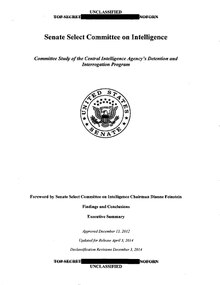
Back لجنة الاستخبارات في مجلس الشيوخ Arabic United States Senate Select Committee on Intelligence German Comité Selecto del Senado sobre Inteligencia Spanish کمیته منتخب امور اطلاعاتی مجلس سنای آمریکا Persian Commission spéciale sur le renseignement du Sénat des États-Unis French ועדת המודיעין של הסנאט של ארצות הברית HE Komisi Khusus Senat Amerika Serikat Bidang Intelijen ID Select Committee on Intelligence Italian 미국 상원 정보위원회 Korean Etterretningskomiteen (USAs senat) NB
| Select committee | |
|---|---|
Active United States Senate 118th Congress | |
 | |
| History | |
| Formed | May 19, 1976 |
| Succeeded | Church Committee |
| Leadership | |
| Chair | Mark Warner (D) Since February 3, 2021 |
| Vice chair | Marco Rubio (R) Since February 3, 2021 |
| Structure | |
| Seats | 17 members |
| Political parties | Majority (9)
|
| Jurisdiction | |
| Purpose | to "oversee and make continuing studies of the intelligence activities and programs of the United States Government" |
| Oversight authority | United States Intelligence Community |
| House counterpart | House Permanent Select Committee on Intelligence |
| Meeting place | |
| 211 Hart Senate Office Building Washington, D.C. | |
| Website | |
| intelligence | |
| Rules | |

The United States Senate Select Committee on Intelligence (sometimes referred to as the Intelligence Committee or SSCI) is dedicated to overseeing the United States Intelligence Community—the agencies and bureaus of the federal government of the United States that provide information and analysis for leaders of the executive and legislative branches. The Committee was established in 1976 by the 94th Congress.[1]
The Committee is "select" in that membership is temporary and rotated among members of the chamber.[2] The committee comprises 15 members. Eight of those seats are reserved for one majority and one minority member of each of the following committees: Appropriations, Armed Services, Foreign Relations, and Judiciary.[3] Of the remaining seven, four are members of the majority, and three are members of the minority.[3] In addition, the Majority Leader and Minority Leader are non-voting ex officio members of the committee.[3] Also, the Chairman and Ranking Member of the Committee on Armed Services (if not already a member of the select Committee) are ex officio members.[4]
As part of its oversight responsibilities, the Committee performs an annual review of the intelligence budget submitted by the president and prepares legislation authorizing appropriations for the various civilian and military agencies and departments comprising the intelligence community. These entities include the Office of the Director of National Intelligence, Central Intelligence Agency, Defense Intelligence Agency, National Security Agency, National Geospatial-Intelligence Agency, National Reconnaissance Office, as well as the intelligence-related components of Department of State, Federal Bureau of Investigation, Department of the Treasury, and Department of Energy.
The Committee makes recommendations to the Senate Armed Services Committee on authorizations for the intelligence-related components of the U.S. Army, U.S. Navy, U.S. Air Force, and U.S. Marine Corps. The Committee also conducts periodic investigations, audits, and inspections of intelligence activities and programs.
- ^ Snider, L. Britt (2008). The Agency & The Hill: CIA's Relationship with Congress, 1946-2004, Chapter 2 (PDF). CIA Center for the Study of Intelligence. Archived from the original (PDF) on May 14, 2008. Retrieved June 19, 2008.
- ^ Kaiser, Frederick (September 16, 2008). "Congressional Oversight of Intelligence: Current Structure and Alternatives". Congressional Research Service. Retrieved April 23, 2009.
- ^ a b c "Committee on Intelligence" from Riddick's Senate Procedure
- ^ "Rules of Procedure" (PDF). U.S. Senate Select Committee on Intelligence. Archived from the original (PDF) on March 31, 2017. Retrieved March 30, 2017.